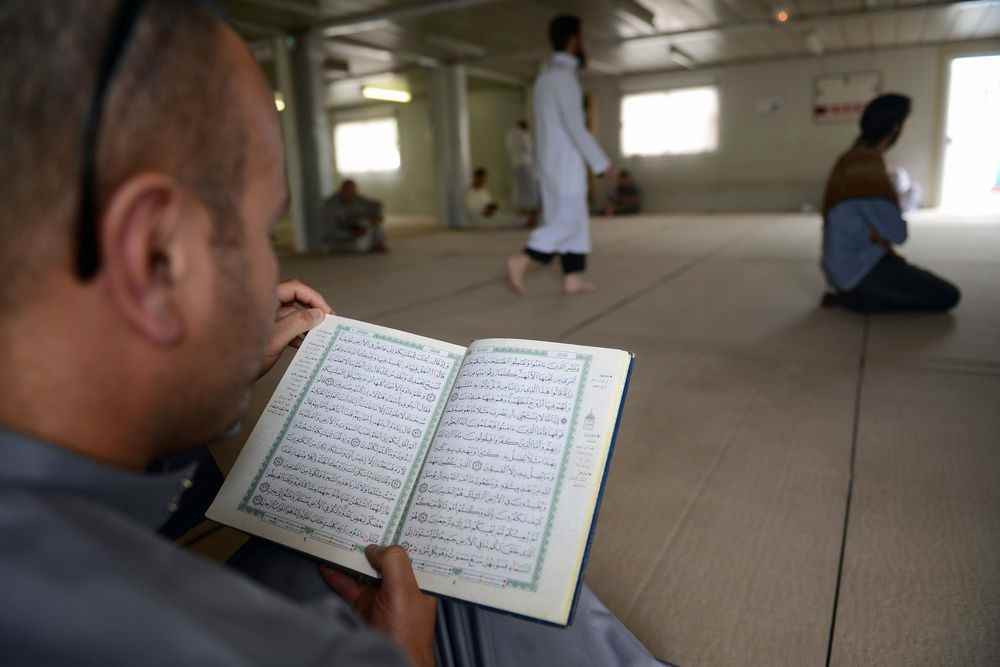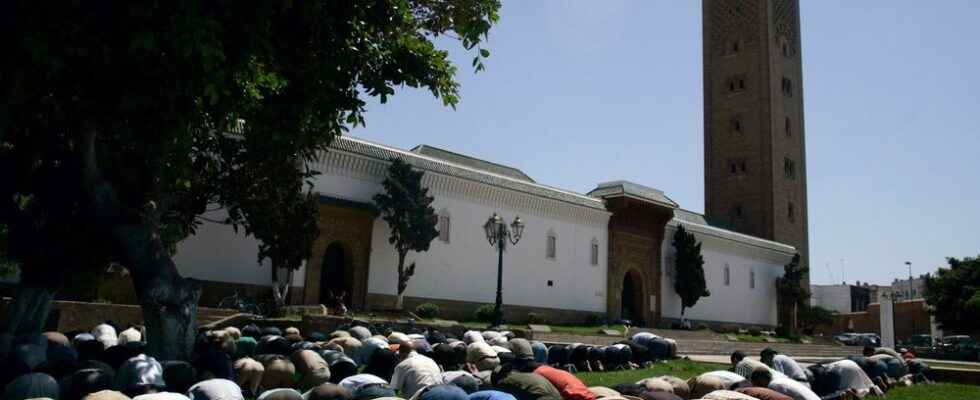Arms laden with books, two young men in ocher djellaba are talking near the fountain, in the center of the patio. All around, the white walls, pierced with arched doors, are enhanced with zelliges, these typically Moroccan earthenware mosaics. Small gardens are nestled between the building bodies.
This setting filled with serenity shelters in fact a veritable hive, entirely devoted to study and devotion. On the first floor, in an amphitheater, 250 students take a course in Islamic jurisprudence. The men are in front. The young women, wearing the traditional headscarf, share the last rows. In an adjoining room, a communication teacher begins an hour of practical work. At the end of the corridor, the library is always full… After the lunch break, in the cafeteria, all the classmates go to the mosque for the midday prayer, before returning to class.
For an Islam of the “golden mean”
At the heart of the university campus of Rabat, capital of Morocco, the Mohammed VI Institute for the training of imams stands out as a beacon for the dissemination of an Islam of the “golden mean”, based on “moderation and tolerance”. An ambitious objective, but above all imperative, to counter the rise of Salafist movements, both locally and internationally.
Inaugurated in March 2015, the institute trains executives of the Sunni Muslim faith. And in the first place: the imam, “the one who is in front”, who leads the prayers, delivers the Friday sermon, and serves as a spiritual referent for the faithful. The institute also trains preachers and “preachers” – a first – capable of delivering the good word on a daily basis, outside of mosques.
For two years, the number of recruits has soared: the institute now welcomes 1,195 students, almost all boarders. Moroccans of course, but also Malians, Ivorians, Guineans, Nigerians, Chadians, as well as about fifty French people, including six women and a handful of converts.
The Royal Mosque in Rabat.
REUTERS/Royal Palace/Handout
“There is a lack of competent imams in the Avignon region, explains O. A, 22, with a hint of a southern accent. philosophy, sociology, history… This allows us to have a good understanding of our religion and to escape the sectarian vision of Islam that some profess.” At his side, his young wife, Maryam, imagines one day becoming a teacher in a private Muslim school.
The presence of this small tricolor colony in Rabat sends France back to an internal dilemma: how, in the country of secularism, to train Muslim religious personnel in line with republican values, without interfering in theological questions or subsidizing worship?
In France, “the courses are not satisfactory”
The issue of imams periodically resurfaces in public debate. It must be said that around 70% of those who work on national soil are not French. Often, they know little about the institutions and the way of life of their audience, which is rather young, but who speaks little or no Arabic at all. In addition, 300 imams are trained and paid by their country of origin, like the Algerians.
Certainly, since the 1990s, there have been training courses in France, but they are provided by private institutes. Two of them depend on the Union of Islamic Organizations of France, a federation of associations close to the Muslim Brotherhood. The third is attached to the Mosque of Paris, of Algerian obedience.
“These courses are not satisfactory, analyzes the Islamologist Rachid Benzine. They do not offer a historical-critical approach to Islamic texts or a comparative study of the texts of the great religions.” Contributor to a report on the status of imams recently submitted to the Ministries of the Interior and National Education, the researcher continues: “Their students are not sufficiently trained in the human sciences. serenely the imamate in the French socio-political context, marked by secularism.”
For lack of a real legal status and a remuneration worthy of the name, the candidates do not jostle at the doors of the mosques. However, the imam often represents the only voice capable of countering the extremist reading of Islam that some young people tinker with, via the Internet or through contact with street preachers.
Morocco’s “religious diplomacy”
Avenues for financing training combining theology and “profane” university knowledge are emerging, through the Foundation of Islam in France (private), approved in December 2016 by the Ministry of the Interior. But the road is still long and full of pitfalls. So many apprentice French imams continue to look abroad: Algeria, Tunisia, Turkey, Egypt, Saudi Arabia…
In this regard, Morocco has won the day. And the training institute for imams in Rabat is its symbol. The establishment is placed directly under the spiritual authority of King Mohammed VI. Known to be from the line of the prophet of Islam, the Moroccan sovereign is the “commander of the believers”. This prestigious title allows Morocco to deploy intense “religious diplomacy”, intended to fight against the jihadist threat which is destabilizing the Sahel, the entire Arab-Muslim world and which is pointing its arms against the West.
The first foreign students to have joined the institute arrived from Mali, the northern half of which suffered the occupation of jihadist groups in 2012-2013. Four other West African countries have adopted the same approach. Mutual interests well understood, at a time when Morocco is making a comeback within the organization of the African Union, after thirty-three years of absence.
Moroccan training, “a temporary solution”
On the French side, an agreement was signed on September 19, 2015 by Laurent Fabius, then Minister of Foreign Affairs, and Ahmed Toufiq, Minister of Habous (Goods) and Islamic Affairs. Candidates are selected by the Union of French Mosques, of Moroccan obedience, which oversees nearly 700 places of worship. Thus, Morocco, which intends to constitute a bridge between the Muslim world and Europe, offers “a temporary solution” to France to satisfy its demand for imams. While keeping an eye on its own diaspora…
In Rabat, nothing is too good to welcome recruits. Their training is supported by the kingdom. They are housed, fed and even paid 2000 dirhams (185 euros) per month. Contrary to their Moroccan co-religionists, graduates after one year, and to the other Africans (two years), the French, holders of the baccalaureate at least, engage themselves for a cycle of three years.

The first year of study is almost entirely devoted to the study of literary Arabic and the memorization of the Koran. (Illustrative photo).
afp.com/REMY GABALDA
The first year constitutes an upgrade, almost entirely devoted to the study of literary Arabic and the memorization of the Koran. Arrived at the start of the school year in September 2016, Khalid, 29, from Le Mans, knows by heart 6 of the 60 hizb (“chapters”) of the sacred book… The following two years combine theological teachings – Koranic sciences, prophetic traditions (hadiths), jurisprudence – and an introduction to human sciences: economy, Hebrew heritage, republican institutions, human rights male…
French academics come periodically to give conference-debates, like the one on jihadism led by the specialist Jean-Pierre Filiu, in October 2016. “Our mission is to train imams anchored in the reality of their country, individuals who can be positive elements in society, for Muslims as well as for non-Muslims”, insists Abdeslam Lazaar, director of the institute, in a woolen caftan and a red fez screwed on his head.
A hundred aspiring French imams expected
The residents of this imam academy also undergo practical training: communication techniques in order to captivate his audience, sermons carried out in the form of tutorials in the mosque, open to the inhabitants of the district… “We will have to deliver a clear message to the faithful, moderate, respectful of all beliefs”, emphasizes Mohamed el-Ouafi, 39, from Avion, in Pas-de-Calais. Imam volunteer for years, this father, electrician in civilian life, wishes to train other representatives of the cult, once back in France.
The first class of French imams to graduate from the Mohammed-VI Institute is expected for the beginning of 2019. The laureates have undertaken to prepare a complementary university degree (DU) in France, focusing on sociology, the law of religions and secularism, alongside future priests and rabbis.
By then, the Institute of Rabat will have further increased its influence and its reception capacity. A huge construction site is underway, bringing out of the ground a 1,400-seat amphitheater, another mosque and 400 additional beds for residents. At the start of the next school year, the contingent of aspiring French imams should reach one hundred, the same as that of African countries. The “transitional solution” offered by Morocco should continue for a few more years.
Mosques in lack of guides
Among the 2,500 mosques and Muslim prayer rooms listed in France, several hundred do not have a permanent imam. About 800 of them are volunteers, chosen from among the faithful, often gathered in a place of worship depending on the family’s country of origin (Algeria, Morocco, Tunisia, Turkey…). Between 120 and 150 mosques are under the influence of Salafist groups. About 20 radical prayer rooms have been closed since December 2015.
From our special correspondent, Boris Thiolay
